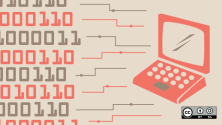Back in 2017, I wrote about why the D programming language is a great choice for development. But there is one outstanding feature in D I didn't expand enough on: the Universal Function Call Syntax (UFCS). UFCS is a syntactic sugar in D that enables chaining any regular function on a type (string, number, boolean, etc.) like its member function of that type.
If you don't already have D installed, install a D compiler so you can run the D code in this article yourself.
Consider this example code:
// file: ufcs_demo.d
module ufcs_demo;
import std.stdio : writeln;
int[] evenNumbers(int[] numbers)
{
import std.array : array;
import std.algorithm : filter;
return numbers.filter!(n => n % 2 == 0).array;
}
void main()
{
writeln(evenNumbers([1, 2, 3, 4]));
}Compile this with your favorite D compiler to see what this simple example application does:
$ dmd ufcs_demo.d
$ ./ufcs_demo
[2, 4]But with UFCS as a built-in feature of D, you can also write your code in a natural way:
...
writeln([1, 2, 3, 4].evenNumbers());
...or completely remove the now-redundant parenthesis to make it feel like evenNumbers is a property:
...
writeln([1, 2, 3, 4].evenNumbers); // prints 2, 4
...So the complete code now becomes:
// file: ufcs_demo.d
module ufcs_demo;
import std.stdio : writeln;
int[] evenNumbers(int[] numbers)
{
import std.array : array;
import std.algorithm : filter;
return numbers.filter!(n => n % 2 == 0).array;
}
void main()
{
writeln([1, 2, 3, 4].evenNumbers);
}Compile it with your favorite D compiler and try it out. As expected, it produces the same output:
$ dmd ufcs_demo.d
$ ./ufcs_demo
[2, 4]During compilation, the compiler automatically places the array as the first argument to the function. This is a regular pattern that makes using D such a joy, so it very much feels the same as you naturally think about your code. The result is functional-style programming.
You can probably guess what this prints:
//file: cool.d
import std.stdio : writeln;
import std.uni : asLowerCase, asCapitalized;
void main()
{
string mySentence = "D IS COOL";
writeln(mySentence.asLowerCase.asCapitalized);
}But just to confirm:
$ dmd cool.d
$ ./cool
D is cool
Combined with other D features, UFCS gives you the power to compose reusable code that has a natural flow to it without sacrificing convenience.
Time to try D
As I've written before, D is a great language for development. It's easy to install from the D download page, so download the compiler, take a look at the examples, and experience D for yourself.








29 Comments